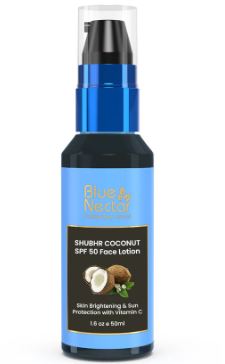In today’s world, sun protection is no longer a luxury—it's a necessity. Harmful UV rays can cause a myriad of skin issues, from sunburns to premature aging, and even increase the risk of skin cancer. However, finding a sunscreen that not only provides effective protection but is also kind to your skin can be challenging. Enter Blue Nectar’s Ayurvedic Sunscreen SPF 50, a product that marries the wisdom of Ayurveda with modern skincare needs. This sunscreen offers robust sun protection while nourishing your skin with natural ingredients.
Why Sunscreen is Essential
Before diving into the benefits of Blue Nectar’s Ayurvedic Sunscreen SPF 50, it’s important to understand why sunscreen is an essential part of any skincare routine. Ultraviolet (UV) radiation from the sun is composed of UVA and UVB rays. While UVB rays are responsible for sunburns, UVA rays penetrate deeper into the skin, leading to premature aging and contributing to skin cancer. Daily exposure to these rays, even on cloudy days, can lead to long-term skin damage.
Using a sunscreen with a high SPF (Sun Protection Factor) shields your skin from these harmful rays, reducing the risk of sunburn, photoaging, and skin cancer. Blue Nectar’s Ayurvedic Sunscreen SPF 50 offers broad-spectrum protection, making it a critical component of your skincare arsenal.
The Ayurvedic Advantage
Blue Nectar’s Ayurvedic Sunscreen SPF 50 is more than just a sunblock; it's a holistic skincare solution that leverages the power of Ayurveda. Unlike many chemical-based sunscreens, this product is formulated with natural ingredients that not only protect your skin from the sun but also nourish and rejuvenate it. Here’s how Ayurveda enhances this sunscreen:
Natural Sun Protection: Traditional sunscreens often rely on chemical filters like oxybenzone and octinoxate, which can cause skin irritation and environmental harm. Blue Nectar’s Ayurvedic Sunscreen SPF 50, on the other hand, uses natural sun protectants like zinc oxide and titanium dioxide. These minerals provide broad-spectrum protection by reflecting and scattering UV rays, preventing them from penetrating the skin.
Nourishment and Hydration: Ayurvedic ingredients like aloe vera, coconut oil, and saffron in Blue Nectar’s sunscreen not only protect but also hydrate and nourish the skin. Aloe vera soothes and cools the skin, reducing redness and irritation caused by sun exposure. Coconut oil is rich in fatty acids that deeply moisturize the skin, while saffron, known for its brightening properties, helps maintain an even skin tone.
Anti-Aging Benefits: One of the most significant advantages of Blue Nectar’s Ayurvedic Sunscreen SPF 50 is its anti-aging properties. Ingredients like sandalwood and turmeric are packed with antioxidants that fight free radicals, which are responsible for premature aging. Regular use of this sunscreen can help reduce the appearance of fine lines, wrinkles, and dark spots, keeping your skin youthful and radiant.
Key Ingredients and Their Benefits
Blue Nectar’s Ayurvedic Sunscreen SPF 50 is a potent blend of carefully selected Ayurvedic herbs and natural sun protectants. Here’s a closer look at the key ingredients and their benefits:
Aloe Vera: Known for its cooling and healing properties, aloe vera soothes sunburned skin, reduces inflammation, and accelerates the healing process. It also hydrates the skin, preventing dryness and flakiness.
Coconut Oil: Coconut oil is a natural moisturizer that deeply nourishes the skin, making it soft and supple. It also has a natural SPF that provides additional sun protection, enhancing the effectiveness of the sunscreen.
Saffron: Saffron is a powerful skin-brightening agent that helps even out skin tone and reduce pigmentation caused by sun exposure. It also provides antioxidant protection, helping to prevent sun-induced damage.
Sandalwood: Sandalwood has been used in Ayurveda for centuries for its anti-inflammatory and soothing properties. It helps calm irritated skin and protects against the harmful effects of UV radiation.
Turmeric: Turmeric is rich in curcumin, a compound known for its potent antioxidant and anti-inflammatory properties. It helps protect the skin from sun damage, reduces the risk of sunburn, and promotes a healthy, glowing complexion.
Zinc Oxide and Titanium Dioxide: These natural minerals act as physical sunblocks, sitting on the surface of the skin and reflecting UV rays. They provide broad-spectrum protection without irritating sensitive skin.
How to Use Blue Nectar’s Ayurvedic Sunscreen SPF 50
To get the most out of Blue Nectar’s Ayurvedic Sunscreen SPF 50, it’s important to apply it correctly:
Apply Generously: Apply a generous amount of sunscreen to all exposed areas of the skin at least 15 minutes before sun exposure. Don’t forget often-missed spots like the ears, neck, and back of the hands.
Reapply Regularly: Reapply the sunscreen every two hours, or immediately after swimming, sweating, or towel drying. This ensures continuous protection throughout the day.
Daily Use: Make sunscreen a daily habit, even on cloudy days or when you’re indoors. UV rays can penetrate clouds and windows, so daily protection is crucial.
Why Choose Blue Nectar’s Ayurvedic Sunscreen SPF 50?
In a market flooded with sunscreens, Blue Nectar’s Ayurvedic Sunscreen SPF 50 stands out for its natural, effective, and holistic approach to sun protection. Here’s why you should consider making it a part of your skincare routine:
100% Natural Ingredients: Free from harsh chemicals, parabens, and artificial fragrances, this sunscreen is safe for all skin types, including sensitive skin.
Ayurvedic Formula: Blue Nectar’s sunscreen is rooted in the ancient wisdom of Ayurveda, offering not just protection but also nourishment and healing for your skin.
Broad-Spectrum Protection: With SPF 50, this sunscreen provides robust protection against both UVA and UVB rays, reducing the risk of sunburn and long-term skin damage.
Eco-Friendly Packaging: Blue Nectar is committed to sustainability, and this sunscreen comes in eco-friendly packaging, making it a responsible choice for both your skin and the environment.






Comments